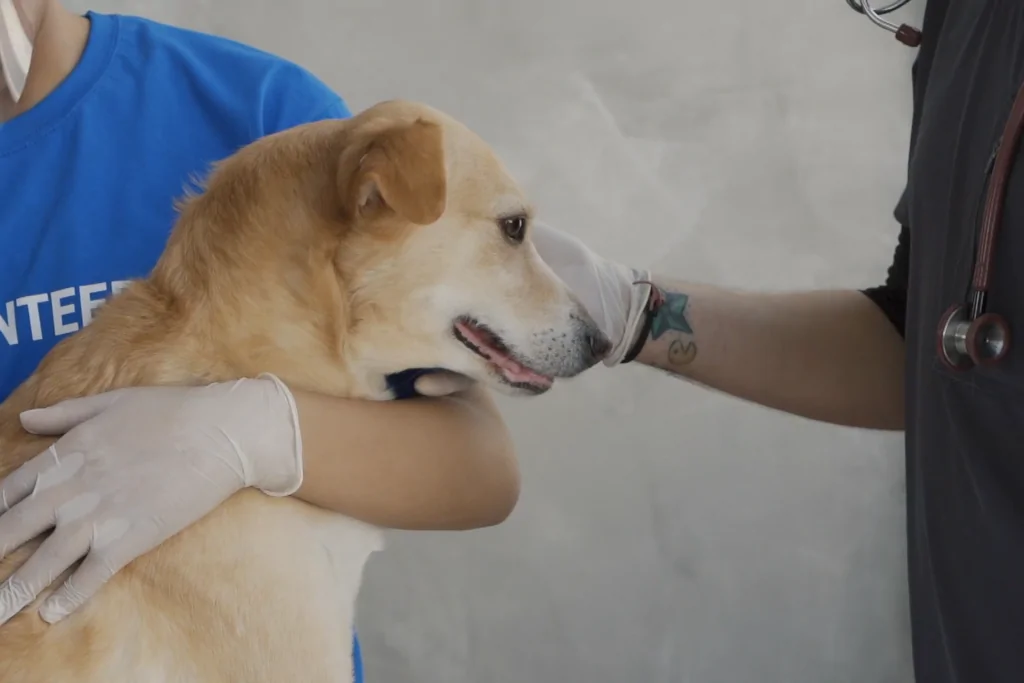Keeping your beloved pooch healthy and happy is always a top priority, but the sneaky world of internal parasites can leave you feeling uncertain and concerned.
With a variety of unwelcome critters that can invade your dog’s insides, it’s crucial to recognize the signs and know how to protect your furry friend from harm.
In this blog post, we look into the common types of internal parasites, their symptoms, and how to combat them effectively. Together, let’s arm ourselves with knowledge to safeguard our canine companions from these pesky invaders.

Types of Internal Parasites
Roundworms
Roundworms, also known as ascarids, are among the most common internal parasites affecting dogs, particularly puppies. They can grow up to several inches in length and resemble spaghetti.
Dogs can become infected through contact with contaminated soil, nursing from an infected mother, or ingesting the eggs from a contaminated environment.
Regular deworming, especially for puppies, is crucial in preventing roundworm infections.
Hookworms
Hookworms are small, thread-like worms that attach themselves to the lining of your dog’s intestines. They feed on blood, which can lead to anemia and other health issues if left untreated.
Infection can occur through ingestion of larvae from the environment or by direct penetration through the skin.
To prevent hookworm infections, keep your dog’s living area clean and ensure they receive regular fecal exams and appropriate deworming treatments.
Tapeworms
Tapeworms are flat, segmented worms that can grow up to several feet in length.
Dogs typically become infected with tapeworms by ingesting infected fleas while grooming.
To protect your dog from tapeworm infections, maintain a consistent flea prevention routine and avoid allowing your dog to scavenge in areas where they might come into contact with dead animals or other sources of infected fleas.
Heartworms
Heartworms are among the most dangerous internal parasites for dogs, as they can lead to severe heart and lung damage if left untreated.
Mosquitoes transmit these worms, which then make their way to your dog’s heart and lungs.
To prevent heartworm infections, provide your dog with a monthly heartworm preventative, as recommended by your veterinarian, and have them tested for heartworms annually.
Understanding the different types of internal parasites is the first step in protecting your dog from these unwelcome guests. The next thing you need to know is the symptoms.
Symptoms of Parasitic Infections
Knowing how to spot a parasitic infection in your beloved canine companion is crucial for getting them the help they need. Symptoms may vary depending on the type of parasite involved, but there are some common indicators to look out for:
- Diarrhea or loose stools
- Vomiting
- Weight loss or poor weight gain, despite a healthy appetite
- Dull or scruffy-looking coat
- Abdominal bloating or swelling
- Coughing or difficulty breathing (in the case of heartworms)
- Visible worm segments in your dog’s feces or around their anus
If you notice any of these symptoms in your dog, contact your veterinarian immediately for an appropriate diagnosis and treatment plan. Early intervention can help prevent severe complications and improve your dog’s chances of full recovery.
Preventative Measures to Protect Your Dog
Preventing parasitic infections is not only vital for your dog’s well-being but also helps reduce the risk of transmission to humans and other animals. Here are some practical steps you can take to protect your furry friend:
- Regular vet check-ups. By prioritizing your dog’s check-ups, you demonstrate your commitment to their well-being, even in the face of a busy schedule or financial concerns. Schedule routine visits to your veterinarian for fecal examinations and recommended vaccinations to detect and prevent parasite infections.
- Deworming. This is an essential aspect of your dog’s health care. Follow your vet’s advice regarding the appropriate deworming schedule for your dog, based on their age, lifestyle, and risk factors.
- Flea and tick prevention. Don’t let fleas and ticks turn your dog’s life into an itching nightmare. Use flea and tick control products as recommended by your veterinarian, and make sure to maintain a consistent prevention routine.
- Heartworm prevention. Heartworms are a serious, potentially fatal threat to your dog’s health. Administer monthly heartworm preventatives as prescribed by your veterinarian and have your dog tested for heartworms annually.
- Maintain a clean environment. This goes beyond just keeping your home tidy. By promptly disposing of your dog’s waste during walks and ensuring their living area is free from feces, you reduce the chances of parasite transmission and create a healthier space for both you and your pet.
- Control wildlife exposure. Avoid allowing your dog to roam unsupervised or scavenge in areas where they might come into contact with infected animals or contaminated soil. Be vigilant about your dog’s surroundings, and keep them on a leash in unfamiliar areas.
By proactively implementing these preventative measures, you’re taking charge of your dog’s health and happiness. Remember, your dog relies on you to keep them safe, and by working together with your vet, you can ensure a long, healthy life for your beloved pet.
Treatment Options for Common Parasites
Treatment for internal parasites in dogs depends on the specific type of parasite involved, the severity of the infection, and your dog’s overall health. Here are some common treatment options for various parasitic infections.
Oral medications
Your veterinarian may prescribe oral deworming medications that target specific parasites, such as roundworms, hookworms, and tapeworms. These medications, such as fenbendazole or praziquantel, may be administered in a single dose or a series of doses.
Make sure to follow your veterinarian’s instructions carefully and complete the full course of treatment to ensure the parasites are effectively eliminated.
Topical treatments
Topical treatments, such as selamectin or fipronil are commonly used for flea and tick control but can also treat certain internal parasites like hookworms and roundworms by killing the parasites’ larval stages.
Tip:
Injections
If your dog is unfortunate enough to contract heartworms, your veterinarian may recommend injectable medications like melarsomine to eliminate adult heartworms.
This treatment requires careful monitoring and may be accompanied by other medications, such as prednisone, to manage inflammation and prevent complications. Make sure you don’t get your dog a human version of prednisone, or take a dog intended prednisone yourself.
Tip:
Supportive care
Depending on the severity of the infection, your veterinarian might also recommend supportive care such as fluid therapy, nutritional support, or other treatments to help your dog recover more comfortably.
A common supplement for dogs recovering from parasitic infections is a high-quality probiotic, which can help restore balance to their gastrointestinal tract.
Keep an eye on your dog’s appetite and energy levels during their recovery and report any concerns to your veterinarian.
FAQs
Alex, a passionate animal lover, has experience in training and understanding animal behavior. As a proud pet parent to two dogs and three cats, he founded AnimalReport.net to share insights from animal experts and expand his knowledge of the animal kingdom.




